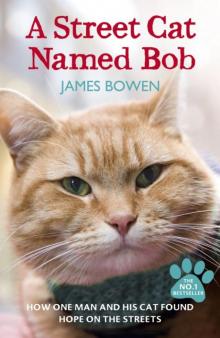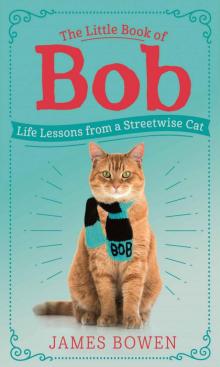- Home
- James Bowen
A Street Cat Named Bob Page 3
A Street Cat Named Bob Read online
Page 3
I found it very hard to fit in at school, mainly, I think, because we’d moved a lot. The chances of me settling into life in Australia disappeared when I was nine and we moved back to the UK and to Sussex, near Horsham. I enjoyed being back in England and have some happy memories of that period. I was just getting back into life in the northern hemisphere when we had to move yet again - back to Western Australia, when I was around twelve.
This time we ended up in a place called Quinn’s Rock. It was there that I think a lot of my problems really began. Because of all this travelling around, we never lived in one house for more than a couple of years. My mother was always buying and selling, moving all the time. I never had a family home and never grew up in one place. We were definitely living some kind of gypsy-like existence.
I’m no psychologist, although I’ve met my fair share of them over the years. There is no doubt in my mind that we moved home way too much, and it was not good for a growing child. It made it very hard for me to become socially adept. At school it was very hard to make friends. I was always trying too hard. I was too eager to impress, which isn’t good when you are a kid. It had the opposite result: I ended up being bullied at every school I went to. It was particularly bad in Quinn’s Rock.
I probably stuck out with a British accent and my eager-to-please attitude. I was a sitting target, really. One day they decided to stone me. Literally. Quinn’s Rock was called Quinn’s Rock for a reason and these kids took advantage of all the nice lumps of limestone that were lying around wherever you looked. I got concussion after being bombarded on the way home from school.
Things weren’t helped by the fact that I didn’t get on at all with my stepfather at the time, a guy called Nick. In my teenage opinion, he was a prick - and that was what I called him. Nick the Prick. My mother had met him when she joined the police back in Horsham and he had come with her out to Australia.
We continued living this same nomadic existence throughout my early teens. It was usually connected to my mother’s many business ventures. She was a very successful woman. At one point she started doing telemarketing training videos. That did quite well for a while. Then she set up a woman’s magazine called City Woman, which didn’t do so well. Sometimes we’d have plenty of money and other times we’d be strapped for cash. But that never lasted for long; she was a proper entrepreneur.
By the time I was in my mid-teens I’d pretty much quit school. I left because I was just sick to death of the bullying I encountered there. I didn’t get along with Nick either. And I was very independent-minded.
I became a tearaway, a wild kid who was always out late, always defying my mother and generally thumbing his nose at authority, no matter what form it took. It wasn’t surprising that I had soon developed a knack for getting myself into trouble, something I have never quite shaken off.
Predictably, I got into drugs, at first sniffing glue, probably to escape from reality. I didn’t get addicted to it. I only did it a couple of times after seeing another kid doing it. But it was the start of the process. After that I started smoking dope and sniffing toluene, an industrial solvent you find in nail varnish and glue. It was all connected, it was all part of a cycle of behaviour, one thing led back to another, which led back to another and so on. I was angry. I felt like I hadn’t had the best breaks.
Show me the child of seven and I’ll show you the man, they say. I’m not so sure that you’d have spotted my future when I was seven, but you could certainly have guessed what lay ahead when I was seventeen. I was set on the road to self-destruction.
My mother tried her hardest to get me off drugs. She could see the damage I was doing - and the even worse problems I was going to cause myself if I didn’t kick the habits I was forming. She did all the things mothers do. She went through my pockets trying to find drugs and even locked me in my bedroom a few times. But the locks in our house were those ones with buttons in the middle. I learned to pick them really easily with a Bobby pin. They just popped out and I was free. I wasn’t going to be hemmed in by her – or anyone else for that matter. We argued even more then, of course, and inevitably things went from bad to worse. Mum got me to go to a psychiatrist at one point. They diagnosed me with everything from schizophrenia, to manic depression to ADHD, or Attention Deficit Hyperactivity Disorder. Of course, I thought it was all bullshit. I was a messed-up teenager who thought he knew better than everyone. With the benefit of hindsight I can see that my mother must have been worried sick. She must have felt powerless and terrified of what was going to happen to me. But I was oblivious to other people’s feelings. I didn’t care and I didn’t listen to anyone.
The situation got so bad between us that for a while I lived in Christian charity accommodation. I just passed my time away there, taking drugs and playing guitar. Not necessarily in that order.
Around my eighteenth birthday, I announced that I was going to move back to London to live with my half-sister from my father’s previous marriage. It marked the beginning of the downward spiral.
At the time, it had seemed like I was setting out into the world like any normal teenager. My mother had taken me to the airport and dropped me off in the car. We’d come to a stop at a red light and I’d jumped out giving her a peck on the cheek and a wave goodbye. We were both thinking that I’d be gone for six months or so. That was the plan. I would stay for six months, hang out with my half-sister and pursue my grand dreams of making it as a musician. But things wouldn’t exactly go to plan.
At first, I went to stay with my half-sister in south London. My brother-in-law hadn’t taken too kindly to my arrival. As I say, I was a rebellious teenager who dressed like a Goth and was - probably - a complete pain in the arse, especially as I wasn’t contributing to the household bills.
In Australia I’d worked in IT and sold mobile phones but back in the UK I couldn’t land a decent job. The first I’d been able to get had been working as a bartender. But my face hadn’t fitted and they’d sacked me after using me to cover for other people’s holidays during Christmas 1997. As if that wasn’t bad enough, they wrote the dole office a letter saying I’d quit the job, which meant I couldn’t collect the benefits I was eligible for by virtue of having been born in England.
After that I’d been even less welcome in my brother-in-law’s house. Eventually, my half-sister and he had kicked me out. I had made contact with my dad and been to see him a couple of times, but it was clear we weren’t going to be able to get on. We barely knew each other, so living there was out of the question. I started sleeping on friends’ floors and sofas. Soon I was leading a nomadic existence, carrying my sleeping bag with me to various flats and squats around London. Then when I ran out of floors I moved to the streets.
Things headed downwards fast from there.
Living on the streets of London strips away your dignity, your identity - your everything, really. Worst of all, it strips away people’s opinion of you. They see you are living on the streets and treat you as a non-person. They don’t want anything to do with you. Soon you haven’t got a real friend in the world. While I was sleeping rough I managed to get a job working as a kitchen porter. But they sacked me when they found out I was homeless, even though I’d done nothing wrong at work. When you are homeless you really stand very little chance.
The one thing that might have saved me was going back to Australia. I had a return ticket but lost my passport two weeks before the flight. I had no paperwork and besides I didn’t have the money to get a new one. Any hope I had of getting back to my family in Australia disappeared. And so, in a way, did I.
The next phase of my life was a fog of drugs, drink, petty crime - and, well, hopelessness. It wasn’t helped by the fact that I developed a heroin habit.
I took it at first simply to help me get to sleep at night on the streets. It anaesthetised me from the cold and the loneliness. It took me to another place. Unfortunately, it had also taken a hold of my soul as well. By 1998 I was totally dependent on it. I probabl
y came close to death a few times, although, to be honest, I was so out of it at times that I had no idea.
During that period it didn’t occur to me to contact anyone in my family. I had disappeared off the face of the earth - and I didn’t really care. I was too wrapped up in surviving. Looking back at the time now, I can only imagine that they must have been going through hell. They must have been worried sick.
I got an inkling of the grief I was causing about a year after I had arrived in London and about nine months or so after I’d taken to the streets.
I had made contact with my father when I’d arrived in London but hadn’t spoken to him in months. It was around Christmas time that I decided to give him a call. His wife – my stepmother – had answered the phone. He refused to come to the phone and kept me waiting for a few minutes, he was so angry with me.
‘Where the f*** have you been? We’ve all been worried sick about you,’ he said, when he had collected himself enough to talk to me.
I made some pathetic excuses but he just shouted at me.
He told me that my mother had been in contact with him desperately trying to find out where I was. That was a measure of how worried she’d become. The two of them never spoke. He shouted and screamed at me for fully five minutes. I realise now it was a mixture of release and anger. He had probably thought I was dead, which, in a way, I had been.
That period of my life lasted a year or so. I’d eventually been picked up off the streets by a homeless charity. I’d stayed in various shelters. Connections, just off St Martin’s Lane, was one of them. I’d been sleeping rough in the market next door around that time.
I ended up on what’s known as the ‘vulnerable housing’ list, which qualified me as a priority for sheltered accommodation. The problem was that for the best part of the next decade I ended up living in horrendous hostels, B&Bs and houses, sharing my space with heroin and crack addicts who would steal anything that wasn’t nailed down. Everything I had was stolen at some point. I had to sleep with my most important possessions tucked inside my clothes. Survival was all I could think about.
Inevitably, my drug dependency got worse. By the time I was in my late twenties, my habit had got so bad I ended up in rehab. I spent a couple of months getting straightened out and was then put on a drug rehabilitation programme. For a while, the daily trip to the chemist and the fortnightly bus ride to my drug dependency unit in Camden became the focus of my life. They became an almost reflex. I’d get out of bed and go and do one or the other on auto-pilot, as if in a daze, which, if I’m honest, I often was.
I did some counselling there as well. I talked endlessly about my habit, how it had started - and how I was going to bring it to an end.
It’s easy to come up with excuses for drug addiction, but I’m certain I know the reason for mine. It was pure and simple loneliness. Heroin allowed me to anaesthetise myself to my isolation, to the fact that I didn’t have family or a huge circle of friends. I was on my own and, strange and unfathomable as it will seem to most people, heroin was my friend.
Deep down, however, I knew it was killing me – literally. So over a period of a few years I’d moved off heroin on to methadone, the synthetic opioid that is used as a substitute to wean morphine and heroin addicts off their habits. By the spring of 2007, the plan was that I would eventually start weaning myself off that and get completely straight.
The move to the flat in Tottenham was a key part of that process. It was an ordinary apartment block full of ordinary families. I knew I had a chance to put my life back on track there.
To help pay the rent I’d started busking in Covent Garden. It wasn’t much but it helped put food on the table and pay the gas and electricity. It also helped to keep me on an even keel. I knew it was my chance to turn the corner. And I knew I had to take it this time. If I’d been a cat, I’d have been on my ninth life.
Chapter 3
The Snip
As we approached the end of Bob’s second week of medication, he was looking a lot brighter. The wound at the back of his leg was healing nicely and the bald and thin patches on his coat had begun to disappear and were being replaced with new, thicker fur. He also seemed happier in his face, his eyes had a more lustrous gleam to them. There was a beautiful, green and yellow glow to them that hadn’t been there before.
He was definitely on the road to recovery, and his boisterousness around the flat was the ultimate proof of it. He had been a whirling dervish, flying around the place since day one, but in the past week or so he’d become even more of a ball of energy. I hadn’t thought it possible. There were times when he would jump and run around the place like some kind of maniac. He would claw furiously at everything and anything he could find, including me.
There were scratches on every wooden surface in the flat. I even had scratches on the back of my hand and arm. I didn’t mind, I knew it wasn’t malicious and that he was only playing.
He had become such a menace in the kitchen, where he would claw at the cupboards and fridge door in an attempt to break into my food supplies, that I’d had to buy a couple of cheap plastic child-locks.
I also had to be careful about leaving anything lying around that might become a plaything for him. A pair of shoes or item of clothing could be scratched to bits within minutes.
All Bob’s actions showed that there was something that needed to be done. I’d been around enough cats in my life to recognise the tell-tale signs. He was a young male with way too much testosterone flying around his body. There was no doubt in my mind that he needed neutering. So a couple of days before his course of medicine finished I decided to call the local vets, the Abbey Clinic on Dalston Lane.
I knew the pros and cons of keeping him ‘entire’, and they were mostly cons. If I didn’t castrate him there would be times when Bob’s hormones would completely take over and he just wouldn’t be able to stop himself from roaming the streets in search of willing females. It could mean that he would go missing for days - even weeks - at a time. He’d also be far more likely to get run over and to get into fights with other cats. As far as I knew, that might have been the cause of the fight that had caused his injury. Male toms are very protective of their territory and produce a distinctive odour to signal their ‘patch’. Bob might have wandered into someone else’s territory and paid the price. I knew it was probably paranoia on my part, but there was also a risk, albeit a very small one, of him contracting diseases like FeLV and FIV, the feline equivalent of HIV, if he wasn’t neutered. Last, but far from least, if he stayed with me, he would also be a much calmer, more even-tempered pet. He wouldn’t be so prone to running around like a maniac all the time.
By contrast the pros in favour of doing nothing amounted to a very short list. It would avoid him having to undergo a small bit of surgery. That was about it.
It was a no-brainer.
I rang the vets’ surgery and spoke to a female nurse.
I explained my situation and asked whether he was eligible for a free operation. She said yes provided I had a certificate from a vet, which I did after my first visits to sort out his leg and get his flea and worm medications.
The only thing that worried me was the medication he was still taking. I explained that he was coming to the end of a course of antibiotics but she said that shouldn’t be a problem. She recommended that I book him in for an operation in two days’ time.
‘Just bring him in and leave him with us in the morning. If everything goes to plan, you’ll be able to pick him up at the end of the day,’ she said.
I got up nice and early on the day of the operation, knowing that I had to get him into the surgery by 10a.m. It was the first time that we’d travelled any distance from the flat together since our visit to the RSPCA.
I hadn’t let him out of the flat, apart from to do his business downstairs, because he was still on his antibiotics. So I stuck him in the same green, plastic recycling box I’d used a fortnight earlier to take him to the RSPCA. The weather was miser
able so I took the lid and let it rest loosely on the box once we were out and about. He wasn’t much more comfortable in it that day than he was the first time I put him in it. He kept sticking his head out and watching the world go by.
The Abbey Clinic is a small place, sandwiched between a newsagent and a medical centre on a parade of shops on Dalston Lane. We got there in plenty of time for his appointment and found the place packed. It was the usual, chaotic scene, with dogs tugging on their owners’ leashes and growling at the cats inside their smart carriers. Bob stood out like a sore thumb in his improvised carrier so was immediately a target for their aggression. Once again, there were several Staffies there with their Neanderthal-looking owners.
Some cats would have bolted, I’m sure. But Bob wasn’t fazed at all. He seemed to have placed his trust in me.
When my name was called out a young nurse in her twenties came out to meet us. She had some paperwork and led me into a room where she asked me what were obviously standard questions.
‘Once it’s been carried out, the operation can’t be reversed. So are you certain you don’t want to breed from Bob at some future date?’ she said.
I just smiled and nodded.
‘Yeah, I’m quite certain,’ I said, rubbing Bob on the head.
Her next question stumped me, however.
‘And how old is Bob?’ she smiled.
‘Ah. I really don’t know,’ I said, before briefly explaining his story.
‘Hmm, let’s take a look.’ She explained that the fact that he hadn’t been neutered was a good clue about his age.
‘Male and female cats tend to become sexually mature at around six months of age. If they are left “entire” after that they go through some distinct physical changes. For instance, toms get fuller in the face, particularly around the cheeks. They also develop thicker skins and generally become quite big, certainly bigger than those cats that have been neutered,’ she told me. ‘He’s not that big, so I’d guess that he’s maybe nine to ten months old,’ she said.

 A Gift From Bob
A Gift From Bob A Street Cat Named Bob
A Street Cat Named Bob The World According to Bob
The World According to Bob The Little Book of Bob
The Little Book of Bob